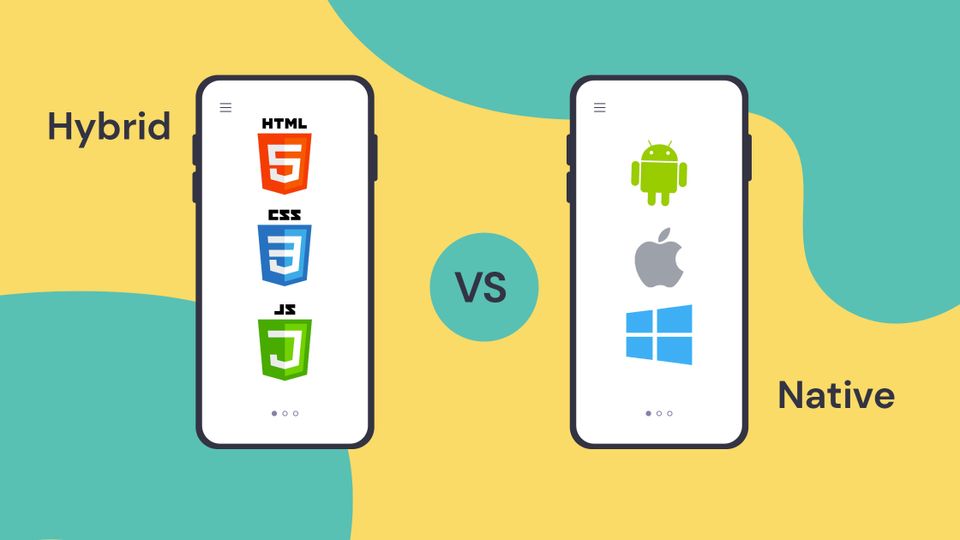Mobile App Development Guide: Native Vs. Hybrid

As the amount of mobile device users is increasing over the years, there is also a rising demand for mobile app development. The number of available apps in March 2017, were 2.8 million apps on the Google Play Store and 2.2 million apps in the Apple App Store. Hugh amounts and the numbers are still increasing. According to GeoMobile, users spend three hours, 23 minutes a day in apps (compared to 50 minutes on mobile web and a little over two hours spent on PCs). No wonder mobile development has increased last years!
More and more companies are aware of the opportunities mobile application development offers. They are searching for ways to incorporate it in their business and marketing strategy. But they are not sure where to start and what they need. Do they really need an app? How does an app fit in the nowadays market developments? Where to start with building an app?
In this blog we inform you about the differences between hybrid mobile development and native mobile development. Knowing the difference means knowing how to start building an app and incorporating them into your business strategy.
Start with the beginning: Operating systems
All mobile devices run on an operating system. The most well-known and used operating systems are iOS and Android. IOS is developed by Apple and therefore running on all Apple devices as iPhone and iPad. Android is developed by Google and is running on almost every other mobile devices as i.e. Samsung, LG, Sony, Huawei. These two operating systems together have a market share of 99,99% with Android as the undisputed market leader. It is important to keep this in mind if you start with mobile development!
Native Vs. Hybrid development?
There are two ways to develop software for mobile devices: native and hybrid. To understand the best way, you need to know the difference.
Native App Development
Each mobile device uses an operating system, otherwise, it can’t be used properly. Almost 100% of the used devices are working on iOS (Apple) or Android (almost all other brands). When developing an app via native development, you develop an app only for one of these operating systems. So only for iOS or only for Android. You use the tools given by the manufacturer to develop the app. If you decide to develop the same app for both operating systems, you actually need to develop two apps. One for iOS and one for Android.
Hybrid App Development
When you prefer not to develop two apps or use the tools of the manufacturers, you can use hybrid development. When using the hybrid way of developing, you develop for all operating systems at the same time. The app is build web based. You can compare this with building a responsive website: you build it once and it works on all systems and all browsers. This way of developing is less labor-intensive, often cheaper, and faster than the native way of development.
Hybrid apps are mainly coded in HTML, CSS and JavaScript and to develop the app, you also need a framework. Used frameworks are i.e. Framework7, PhoneGap and Cordova.
Native and Hybrid App Development: Pros and Cons
Building a hybrid app is often faster, cheaper and less labor-intensive. Why still doing native development? We have placed all the pros and cons in one overview. With this information you can make your own decision!
Native Development
| Advantages | Disadvantages |
| – Fast and responsive | – Difficult languages to learn – years of experience is needed |
| – The best performance | – More expensive |
| – Distributed in app stores | – More time consuming |
| – Overall better user experience | – Too much work for simple apps |
| – Separate apps per platform |
Hybrid Development
| Advantages | Disadvantages |
| – Built on web technology i.e. HTML/CSS/JavaScript. Easier to build. | – Slower than native apps |
| – Cheaper than a native app | – Dependent on a third party platform (framework) |
| – One app for all platforms | – Less interactive than native apps |
| – Faster to develop than native apps due to single code base. | – Bug fixes more difficult due to issues that stem from both native systems and hybrid systems |
| – Distributed in app stores | |
| – Able to access native/device APIs |
Ready to decide?
What do you think is the best way to develop apps? Do you prefer native or hybrid. At Global BrainForce we have a slight preference for hybrid. Why? See the pros in the above table: i.e. one app, less time consuming, and cheaper.
If you would like to build a corporate mobile app, do not hesitate to contact our team. We would be glad to discuss your requirements for the app to deliver the needed dedicated staff or to determine the scope of your project and give you a fixed budget and deadline.
You may contact us online to share your requirements.





